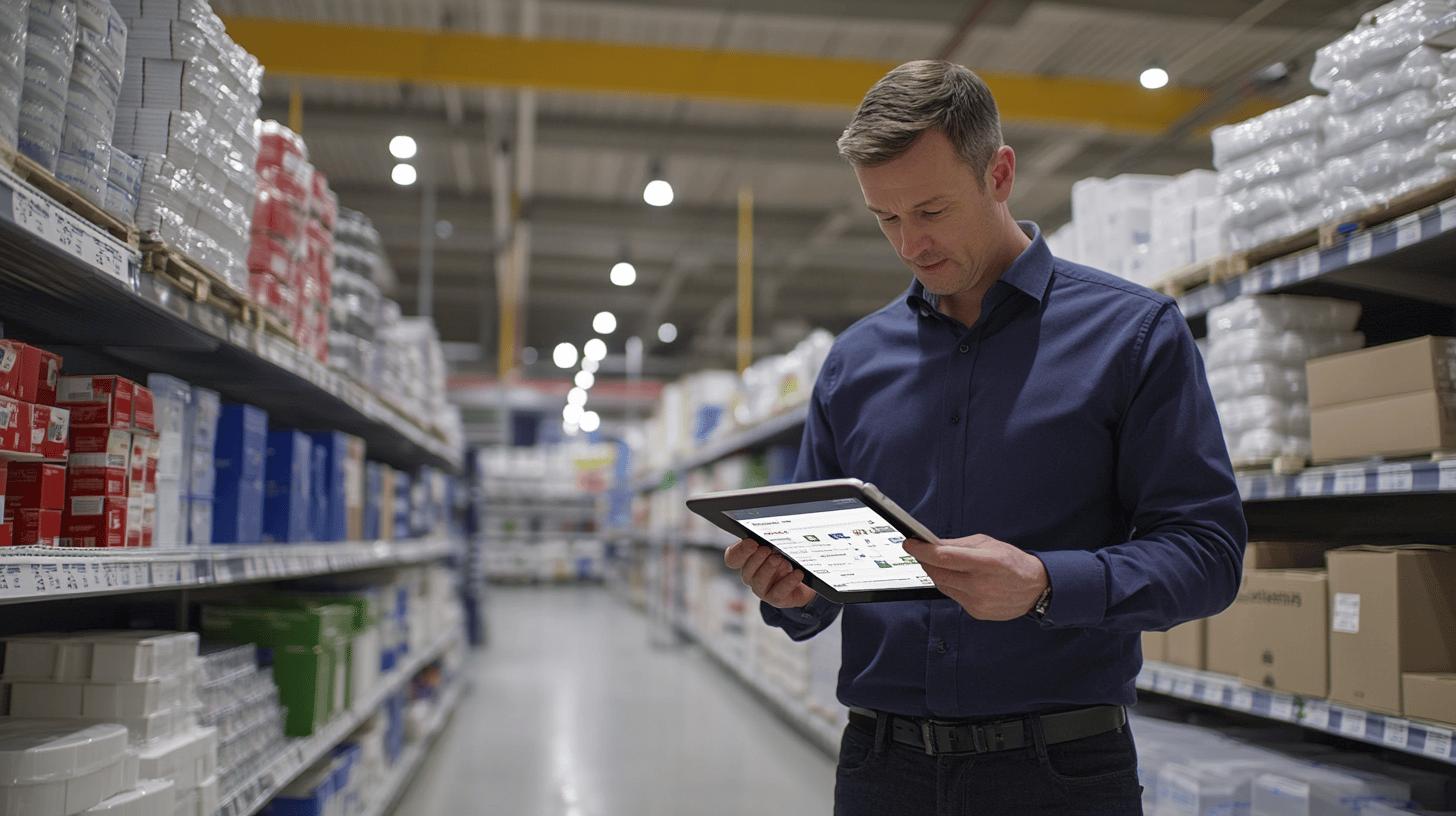
Integration with ERP Systems Boosts Eco Compliance


Integration with ERP Systems Boosts Eco Compliance

How ERP System Integration Optimises Environmental Compliance in Retail Supply Chains
Integration with ERP systems is revolutionising environmental compliance in retail supply chains. Q-Hub's innovative solutions connect previously isolated processes, centralising data and automating compliance workflows. This transformation eliminates error-prone manual systems, creating a seamless digital environment that tracks emissions, generates compliance reports, and ensures supplier accountability in real-time. By removing operational silos, retailers gain actionable sustainability insights across their entire supply chain while dramatically reducing compliance risks.
The real power of ERP integration lies in its immediate visibility capabilities. Retailers can monitor environmental metrics across multiple locations simultaneously, identifying deviations from standards before they escalate into regulatory issues. This level of transparency extends throughout the supply chain, allowing businesses to trace environmental impacts from raw materials to finished products. In today's eco-conscious marketplace, this comprehensive oversight not only satisfies regulatory requirements but significantly enhances consumer trust.
Transforming Compliance Through Digital Intelligence

The transition from fragmented paper-based systems to integrated digital compliance workflows mirrors the journey seen in many Q-Hub implementations. Organisations like Scottish Leather Group discovered that unifying their environmental processes through a centralised platform dramatically improved their ability to maintain compliance across multiple ISO standards while reducing administrative burden.
Modern ERP systems excel at automating regulatory reporting, consolidating data from dispersed departments and suppliers into a unified platform. This centralisation provides instant access to compliance information, reducing errors and saving valuable time. Intelligent dashboards offer real-time visibility into environmental performance, flagging anomalies such as unexpected waste spikes for immediate intervention.
By digitising our compliance processes with Q-Hub, we eliminated hours of manual work while significantly improving our ability to monitor sustainability metrics across multiple sites.
These capabilities ensure retail supply chains remain audit-ready while enabling proactive environmental management rather than reactive fire-fighting. Companies implementing such systems typically experience:
- Automated compliance alerts that notify teams of regulatory changes in real time
- Advanced carbon footprint tracking tools for monitoring environmental impacts
- Digitised compliance records that eliminate paperwork errors and improve audit readiness
- Real-time sustainability dashboards providing visibility across operations

By digitising compliance workflows, retailers can avoid the common pitfalls of manual processes, including missed deadlines, incomplete documentation, and poor visibility into supply chain activities. Q-Hub's robust data management and automated alert systems ensure these compliance risks are systematically eliminated.
Unlocking Sustainable Advantages with Green ERP
Retailers adopting green ERP systems can transform their environmental performance by embedding sustainability directly into operational workflows. These systems provide real-time inventory visibility that dramatically reduces waste through optimised stock management. For example, a UK supermarket implementing similar technology reduced waste by 20% across its supply chain.
Energy efficiency represents another critical area where these systems deliver measurable improvements. Integrated energy management tools track consumption patterns across retail locations, identifying inefficiencies and enabling targeted improvements. One high-street retailer achieved a 15% reduction in energy consumption within a year of implementation, demonstrating both environmental and financial benefits.
| ERP Feature | Compliance Benefit | Business Impact |
|---|---|---|
| Automated Alerts | Timely Regulatory Updates | Reduced Compliance Risk |
| Digitised Records | Improved Audit Preparedness | 80% Less Preparation Time |
| Real-Time Dashboards | Continuous Compliance Monitoring | Proactive Issue Resolution |
Building Transparent Supply Chains Through Connected Data
Supply chain transparency has become non-negotiable in today's retail environment. ERP integration eliminates visibility gaps across multi-tier supply networks, providing complete environmental oversight. This interconnectedness allows retailers to monitor supplier sustainability performance, track environmental impacts, and address compliance risks before they escalate.
Real-time data tracking forms the backbone of this transparency revolution. It enables retailers to monitor carbon emissions, waste outputs, and resource utilisation as they happen. Multi-tier visibility illuminates the entire supply chain from raw material sourcing to final delivery, quickly identifying suppliers failing to meet sustainability standards. This level of oversight strengthens accountability while meeting growing consumer demand for sustainable practices.
Advanced analytics within these systems identify compliance gaps by processing vast amounts of supply chain data and flagging anomalies that would otherwise go unnoticed. Q-Hub's implementation experience shows that companies leveraging these insights can continuously align operations with evolving environmental standards while building a genuine culture of sustainability.
Essential Best Practices for Successful Implementation
Successful ERP integration for environmental compliance requires thoughtful planning and execution. Rather than simply installing software, organisations must establish a foundation connecting technology with clear operational sustainability goals. Without this strategic alignment, businesses risk creating new data silos rather than resolving them.
Stakeholder involvement represents the cornerstone of effective implementation. Every department plays a role in meeting environmental standards, making early engagement essential for addressing concerns and leveraging expertise. As seen in Q-Hub implementations like Fowlers of Bristol, bringing all critical workflows and datasets into a single digital space enables instantaneous access to real-time environmental data.
Before full deployment, conducting pilot testing in controlled environments allows teams to identify and resolve integration challenges. This approach minimises disruptions while building confidence in the system's capabilities. Finally, robust data management ensures the ERP system functions as the single source of truth for all compliance information.
Companies maximising environmental compliance through ERP integration typically follow these essential practices:
- Define clear sustainability objectives that guide integration efforts
- Ensure seamless communication between systems through effective APIs
- Engage stakeholders from all departments to address operational concerns
- Implement regular training to drive system adoption and proficiency
- Continuously refine workflows to align with evolving regulations
This commitment to continuous improvement forms the backbone of effective compliance monitoring. As regulations evolve and supply chains grow more complex, regularly analysing system performance and updating workflows keeps retailers ahead of compliance requirements.
The Future of Environmental Compliance Technology
The landscape of ERP-driven environmental compliance is evolving rapidly as digital transformation in retail accelerates. Cloud-based systems are becoming essential for scalability and operational efficiency, providing the foundation for data-driven sustainability. Without embracing these innovations, retailers risk falling behind in meeting both regulatory requirements and consumer expectations.
IoT integration represents a major advancement in this space, with sensors monitoring energy usage and waste generation throughout the supply chain. This real-time data feeds directly into centralised systems like Q-Hub, enabling immediate responses to compliance risks. Simultaneously, predictive analytics is emerging as a game-changer, allowing retailers to forecast potential environmental challenges before they materialise.
Looking ahead, we can expect further innovations including lifecycle assessment tools, enhanced sustainability dashboards, and seamless global data integration. These advancements represent essential steps toward meeting long-term sustainability goals while addressing increasingly stringent regulatory demands.
Ready to transform your environmental compliance approach? Q-Hub's customised software solutions help retailers streamline compliance processes, enhance operational efficiency, and build sustainability into their supply chain DNA. Our experience digitising complex compliance workflows enables businesses to achieve both environmental excellence and operational efficiency, creating resilient, responsible retail operations for the future.
Start using Q-Hub today
- Manage compliance in one place
- Streamline your teams and tasks
- Use Q-Hub free for 30 days






